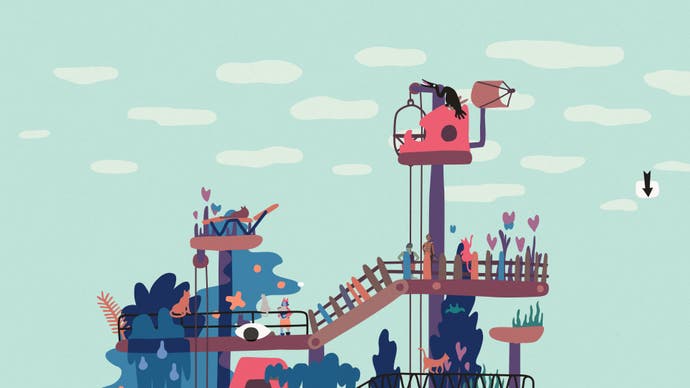Saltsea Chronicles review - a dreamy adventure that contains multitudes
Cloud atlas.
Don't call me Ishmael. Today, you can call me the whole rabbling cast of the Pequod. This is the beautiful, improbable conceit at the heart of Saltsea Chronicles, because it's a game in which you put to sea not as a sailor but as a crew. And it's a crew that's already hurting, anxious and uncertain of things. A crewmate has disappeared without warning. Where did they go? Who took them, and why? The horizon calls.
Saltsea is set in a world that floats on the flooded remains of a prior world - maybe even our world. If so, were we good ancestors? Below the waves are strange creatures and old buildings that once claimed to scrape the sky, all threaded with skate parks of coral and ornamental fronds of disco kelp. Above? Above is everything that has survived, and has collapsed over time, and has had new thinking and new communities scribbled over the top and bolted onto the edges. One island here is a submerged ocean liner, another is clearly cobbled together from flotsam.
I just looked flotsam up: debris in the water that was not deliberately thrown overboard. That's a lovely definition, and a lovely way of looking at the archipelago on which Saltsea is set. Here is a place that was inherited by accident, and the things the people who live there now love and value are the results, in part, of the granular erosion performed by time. It's a world built of bits and pieces that have been made to fit, and which have been giving new meanings. God, I love it.
Crucially, before we get to the point of this game, which is all about stories, Saltsea has found a perfect visual means to deliver this world. Building on the aesthetic of Mutazione, a previous narrative game from Die Gute Fabrik, Saltsea uses great chunks of rich, felty colour to create characters and locations alike. It's wonderful at finding harmonious colour pairings. The game's menu, with its blues, whites and reds takes me back to printed schoolbooks and mimeo ink, while the regular interstitial logo appearances that break up the narrative are so playful with their combinations that I found myself screenshotting them all.
It also manages to create people and places without much in the way of outlines, and only very sparing uses of line in general - a doodled nose here or a prominent chin there. Instead, the people you meet are rangy and cheery with tubelike limbs and the improbable wobbling stances of those billowing pipe creatures you get outside of American gas stations. In close up they're all Picasso ripples and single-eye perspectives. There's a bit of Miro in the mix - particularly because of the softness of it all, but I feel like Saltsea mainly draws from children's books from the 50s and 60s. That lovely textured colour, pasted down in friendly curving shapes. Those bendy limbs and kidney bean heads with noses and ears stuck on from elsewhere - a kind of Kindergarten spin on identikit portraiture.
When a specific character is speaking, they'll be outlined in white, as if they were a sticker, and the wider world is the perfect stickerbook compliment for them, all simple forms and judicious use of silhouette and space. There's a coral island that's used for emotional recovery here, and is delivered in sweet ice cream shades, while a volcano is a massive hump of dark material spotted with chunks of brightness: fruit in the fruit cake. The risk of using colour like this is that the image has no depth - everything in Saltsea exists on the same plane. But this just makes the use of colour and shapes more impressive: landmasses quietly change in hue as they scale upwards, while rooms are loops of colour - emotional, expressive cocoons as much as physical chambers
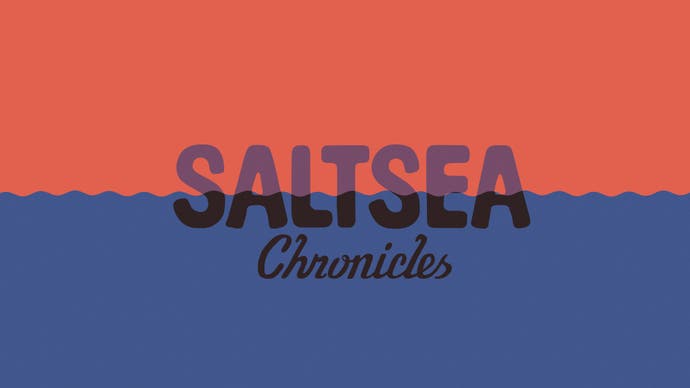
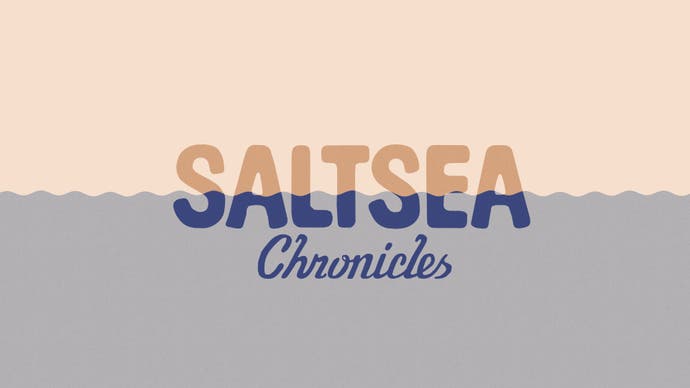
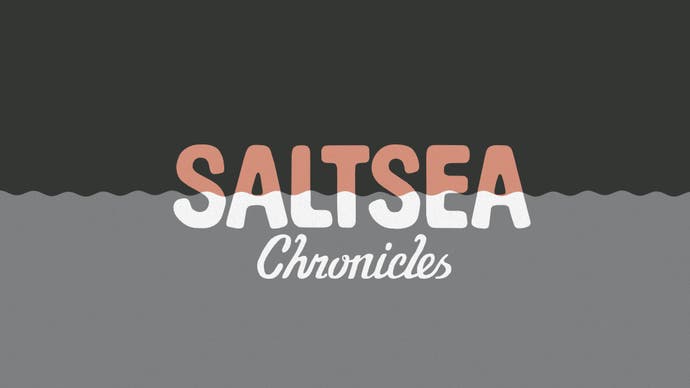
So Saltsea looks like a great old storybook and plays, at times, like a new translation of Homer. It's obsessed with islands, obviously, but, through them, with arrivals and departures, chance encounters, and the endlessly complex question of how we treat strangers.
This particular Odyssey: In pursuit of their missing friend, your crew takes to sea and travels across a whole archipelago in search of them. The game unfolds, for the most part, in text. Text as you chat on board the ship, shifting between crew-mate from one line to the next, or as you move around an island meeting people and trying to work out what's happened and what it could all mean.
There's a lot of reading, but reading is brilliant and Saltsea's also fiercely active with it. Take the time spent on the ship: you can mouse or pad your way across a cut-out view of the craft, selecting bright dots that will indicate opportunities: a conversation is to be had, perhaps, or maybe there's just a moment to witness here, a quick description of how someone feels up on deck or what the distant rain looks like. It's the same on land, as you travel from one area to another, your movement taking the form of a lovely sinuous chalk doodle, and you spot things, chat to people, get a sense of the place and wonder where to go next.
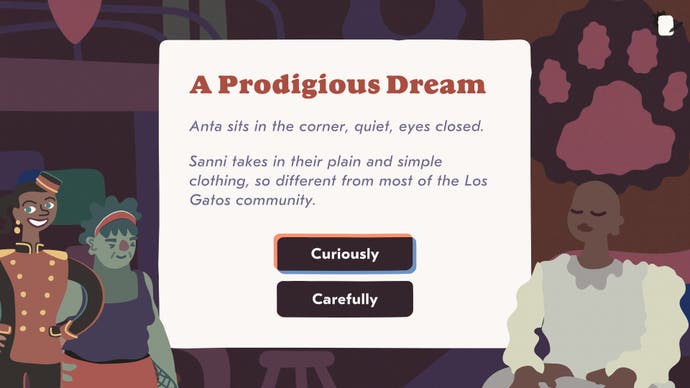
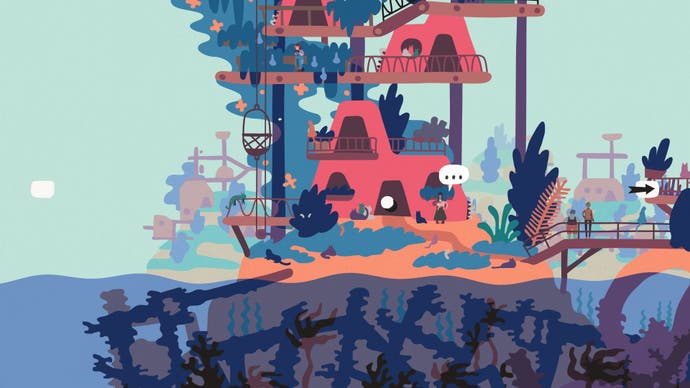
Each island is its own community, and often its own style of game. One is a gentle probing of group affiliations, another is an unusual murder mystery. This is all filtered through a very simple dynamic, which proves extremely compulsive and accelerative. It's binary choices. Every now and then a conversation will lead to a point where you're asked how to react. Or a question from someone will lead to a choice in how to respond. There will only ever be two choices to make in each case, and the choices are just beautiful - another thing I tended to screenshot as I went.
Here you go: Questions/Suspicions? Anger/Fear? Doubts/Reassurance? Hesitation/Certainty? Politely/Bluntly? Silence/Intrigue?
From these neat double-acts, the game ripples outwards, an adventure, but never just as adventure. Through binary choices, it turns out you can explore the world and learn its lore - learn of dreamsailing, a kind of inward travelling; of the rarified role of the radio in this society; you can learn how to play an entire card game called Spoils, which comes with its own sharp local variants. And more: you can learn what your crew thinks of one another, how they fall out and patch things up and make the space between them stable over time.
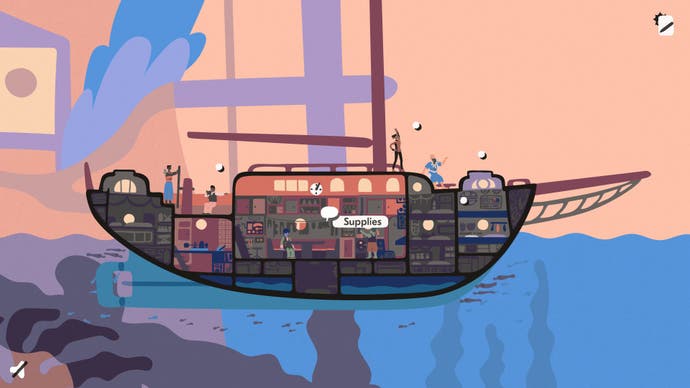
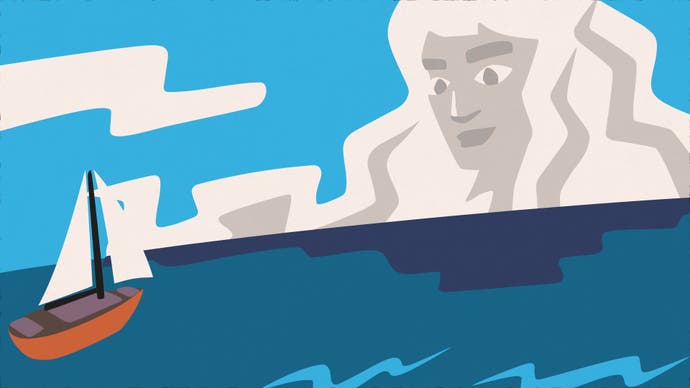
These choices often form a series of steady rituals that keep things moving. You pick between two locations when deciding where to go next, based on what you've learned so far, and you choose which two crewmates to take on shore when you get there. Then you get the slightly less regular rituals: who to believe in a dispute, or who to allow aboard when they ask to join the crew. Beyond that the game opens out further, until it reaches the horizons.
Few of these choices take long to consider, and over the course of a long session you'll get a web made up of hundreds of them, making everyone's playthrough of the game, everyone's experience of the story, wildly different. The genius, though, is that these choices are not big life-changing headscratchers for the most part. They're little things, instinctive things, often things you don't even have to check in with yourself before deciding on.
And what do you get from this? You get a game that is happy to explore everything in its world, and that will reward your interest. Nothing, for me, crystallised Saltsea's approach to story so much as a conversation I had in-game with two archaeologists who were exploring a crack in the side of a volcano. What are you looking for? I asked. What are we looking at? they replied. A lovely distinction, because my question was focused and exclusionary, while theirs was open-ended, curious, strangely democratic. It reminded me of a glorious sequence from the film Zero Effect, in which the hero, a detective, explains that looking for a single thing is hard, because of all the things in the world you're just after one of them. But looking for anything is easy, because of all the things in the world, you're bound to find a few.
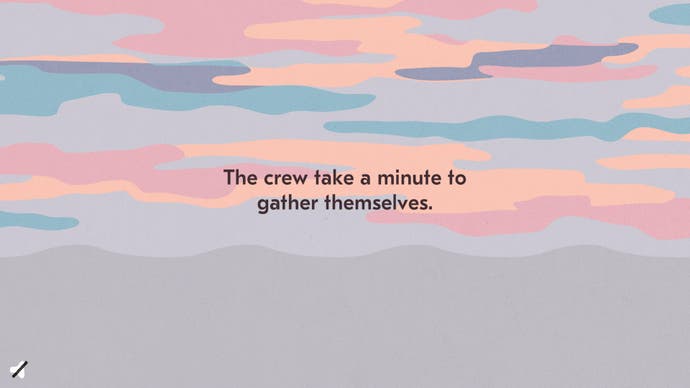
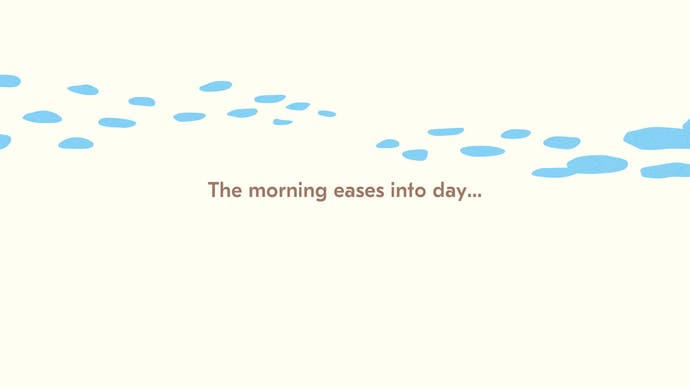
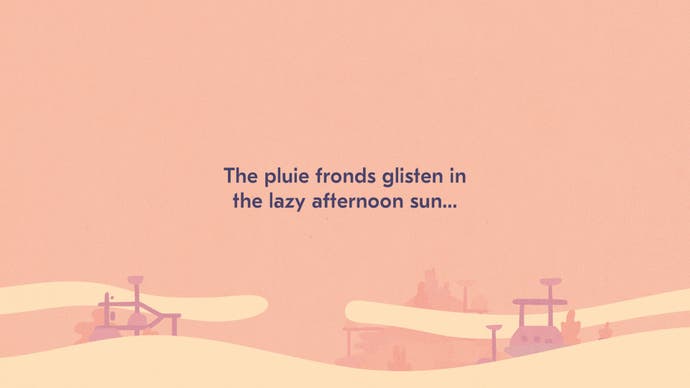
Bringing this all together is character - the crew you inhabit across the course of the game, the people you meet, travel with, leave behind, search for. I will admit: I thought at this point, oh, I'll just do a quick character sketch of a few crew members to give people a taste of things, and be done with it. And yet that's not possible - and it's to the game's credit that it's not. The people here resist easy description despite being very richly conceived. I think it's because they're not just filled with potential contradictions, but filled with potential itself - there's a wide range of things they might be, and might become, just as the story itself has a huge potential space, whose contours perhaps become more clear over repeated plays. So even the simplest of these players, say a fusty, slightly verbose academic, is not really a fusty verbose academic, so much as someone who has possibly found themselves trapped in that role, or - perhaps - likes the limitations that the role imposes in their day-to-day life. Everyone here contains multitudes.
Onwards you go in pursuit of your missing crew, then, your story diverging further from mine with every island choice, with every flick of the head or settling of the lips. Memories/Artefacts? Skeptical/Curious? And astonishingly, through all these moving parts, all this phase space, my story still made rich sense, and actually built to a truly devastating climax.
Scream/Weep? Fittingly, for me, Saltsea Chronicles turned out to be a story about choices as well as a story made of choices. It made me think about the big decisions I make in life, but also the decisions that shape a life that I don't even notice having made. Ripples turning to waves and all that. You must play this. It's luminous.
